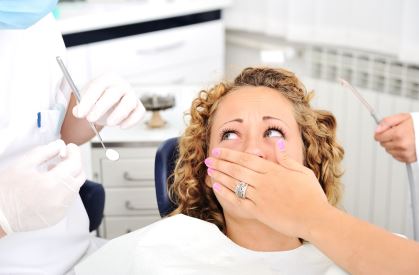Dental phobia is a much more severe manifestation of the simple dread that many people have about going to the dentist for a visit. As many as 75% of all people experience some degree of anxiety before a dental appointment, particularly when they know it will involve something other than a simple cleaning, but dental phobia can actually leave a person panic-stricken, almost to the point of being terrified of the impending visit. Many thanks to Dr Lubna Alam-Orths, of True Dentistry, who specialise in treating nervous dental patients in the Bolton area.
Even though most dental phobia patients realize this is an irrational fear, it’s still one they often cannot shed or overcome on their own. In many cases, people who have dental phobia will do everything possible to avoid going to the dentist, and may finally do so only when in extreme pain, or out of absolute necessity.
Symptoms of dental phobia
in addition to the symptoms described above, patients anticipating a trip to the dentist will often have difficulty sleeping the night before a visit, or possibly even several nights before. As the day approaches, patients often experience an escalation of the nervousness and anxiety they’ve been feeling.
This may be accompanied by bouts of crying or physical illness that literally incapacitate the patient. During the procedure itself, patients with dental phobia will often feel extreme discomfort about having any kind of objects placed in their mouth, a constant fear of what will happen next, and perhaps even moderate to severe difficulty breathing, despite assurances by dentists or their assistants.
How dentists help with phobias
One of the simplest methods dentists employ to help patients with dental phobia is a technique commonly referred to as ‘gentle dentistry’. This involves several practices which are all intended to calm the patient and reduce fear of the unknown. One technique includes explaining procedures in a very soothing manner to the patient, coupled with positive reinforcement at each phase of a procedure managed relatively well by the patient.
Some dentists make use of relaxation techniques, beginning with the use of very soothing, relaxing music that is piped into the procedure room. Less severely phobic patients can be guided through deep breathing exercises, muscle relaxation, and a progressive desensitization to dental tools and objects for the reduction of anxiety. For instance, if a patient’s primary fear is of needles, systematic desensitization would gradually expose the patient to the needle, providing sufficient time for the patient to become comfortable with it.
For more severe cases sedation dentistry can be used, which generally involves the use of oral sedatives that relax the muscles and promote a much less stressful mental state. Usually oral sedatives induce drowsiness as well, so patients remember little of the procedure while in the dentist chair, which can also help to lessen their fears for the future.
When milder sedatives fail to accomplish the desired result with a given patient, general anesthesia can be an alternative, although this could make it difficult or impossible for the patient to cooperate during a procedure. Some nervous patients respond well to nitrous oxide, commonly known as laughing gas, which induces something like a state of euphoria in the patient. Other patients require formal prescription for medication such as Valium or Xanax before undergoing a dental procedure.
How patients can help themselves
There are several self-help methods that patients can employ to ease their fears prior to a dental appointment. It helps greatly if a patient feels a sense of trust and has a rapport with a specific dentist, so choosing such a dentist can be a great benefit to the patient. Sometimes communicating with a dentist prior to the appointment to discuss the specific procedures that will be occurring will lessen a patient’s fears.
It is sometimes effective for patients to bring a stress relief object along on the appointment, for example a soft rubber ball that can be squeezed during moments of high stress or discomfort. Bringing a friend, relative, or any trusted member of one’s support network can be very comforting to a dental patient. Relaxation techniques such as meditation or yoga can work wonders with some patients, especially if coupled with an effort to think positively about the upcoming procedure.
One of the most effective methods to emerge in recent times for patients to help themselves with their anxieties about dental visits is involvement with online communities. Recent research suggests that involvement with an online community and the support of community members is a big help for patients needing to confront their phobias or whatever anxieties they feel, before receiving the dental care they need.
The purpose of such groups in general is to provide ongoing moral support for members, and online communities for dental phobia patients are no exception. Many patients have benefited considerably from exchanges with their peers, and this has bolstered their confidence prior to a visit.

